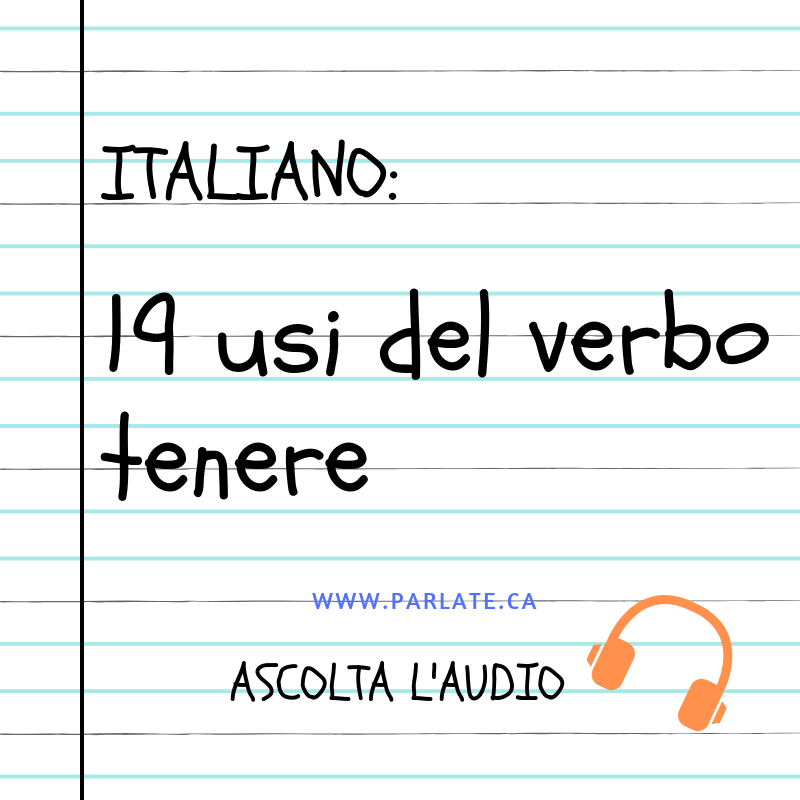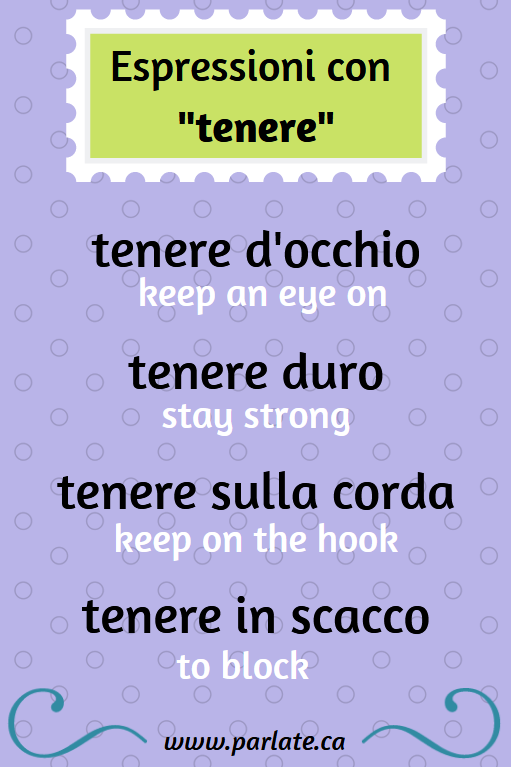Il verbo “tenere” è uno di quei verbi multiuso proprio come il verbo “get” in inglese. Quando è accompagnato da nomi o preposizioni differenti, assume significati diversi.
The verb “tenere” is one of those multi-purpose verbs just like the verb “get” in English. When it’s accompanied with different nouns or prepositions, it takes on different meanings.

Ecco 19 degli usi più comuni con il verbo “tenere”. Non è facile impararli a memoria, ma ascoltandoli e ripetendoli molte volte diventeranno familiari.
Here are 19 of the most common uses of the verb “tenere”. It’s not easy to memorize them, but by listening to them and repeating them many times they’ll become familiar.
Tenere al buio – to keep someone in the dark:
Significa tenere qualcuno al buio di qualcosa, lasciarlo nell’ignoranza e non dargli notizia di qualcosa.
It means keeping someone in the dark of something, leaving them in ignorance and not giving them news of something.
Esempio:
Nelle dittature il popolo è tenuto al buio./ In dictaorships the population is kept in the dark.
Tenere banco – to lead the show:
Animare, rendere vivace una conversazione attirando su di sé l’attenzione di tutti.
Animate, make a conversation lively by attracting everyone’s attention.
Esempio:
Alle feste mio padre tiene sempre banco./ At parties my father always leads the show.
Tenere botta – to stay strong:
Vuol dire resistere, e non mollare nelle situazioni difficili ed anche dare valore ad un argomento.
It means resisting, and not giving up in difficult situations and also giving value to a topic.
Esempio:
La primavera tarda a venire, ma teniamo botta!/ The Spring is late, but we are staying strong!
Tenere dietro a qualcuno – to keep up with someone:
Significa seguire qualcuno e stare al suo passo. In senso figuritivo s’intende seguire, comprendere quanto dice una persona.
It means following someone and keeping up with them. In a figurative sense it means to follow, understand what a person is saying.
Esempio:
Non riuscivamo a tenerle dietro./ We weren’t able to keep up with her.
Tenere duro – to stay strong/to hold on:
Ha lo stesso significato di “tenere botta”, e cioè, perseverare.
It has the same meaning as “tenere botta”, that is, to persevere.
Esempio:
Terremo duro fino alla fine della corsa./ We’ll persevere until the end of the race.
Tenere la bocca cucita (o chiusa) – keep one’s mouth sealed:
Vuol dire tacere, fare silenzio o anche non divulgare informazioni su un argomento preciso.
It means being silent, quiet or even not disclosing information on a specific topic.
Esempio:
È un segreto quindi bisogna tenere la bocca cucita./ It’s a secret therefore we have to keep our mouths sealed.
Tenere la candela – to hold the candle:
Ci si riferisce a chi si trova ad essere solo insieme ad una coppia di innamorati o, comunque, di persone che si scambiano continue effusioni.
It refers to those who find themselves alone with a couple of lovers or, in any case, with people who are continuously exchanging effusions.
Esempio:
Non è divertente tenere la candela./ It’s not fun to hold the candle.
Tenere il becco chiuso – to keep one’s mouth shut:
Simile a “tenere la bocca chiusa”, ma può avere un tono meno cordiale e più perentorio, tipo “stare zitto”.
Similar to “tenere la bocca chiusa” , but it can have a less cordial and more peremptory tone, like “shut up”.
Esempio:
Spero che tu tenga il becco chiuso!/ I hope you keep your mouth shut!
Tenere il coltello dalla parte del manico – to have someone at the sharp end of the knife:
Essere in posizione vantaggiosa, e avere in pugno una situazione. Quindi essere in condizione d’imporre la propria volontà.
Being in an advantageous position, and having a situation under control. Therefore, being in a position to impose one’s will.
Esempio:
Alla fine della discussione teneva il coltello dalla parte del manico./ At the end of the argument he had us at the sharp end of the knife.
Tenere il piede in due scarpe (o due staffe) – to keep a foot in both camps:
Mantenere buoni rapporti con due parti in contrasto, per poi schierarsi con il più forte al momento opportuno. Fare il doppio gioco.
Maintaining good relationships with two contrasting parts, then taking sides with the stronger one at the right time. Playing a double game.
Esempio:
Gli opportunisti tengono il piede in due scarpe./ Opportunists keep a foot in both camps.
Tenere (o reggere) il sacco a qualcuno – hold the bag to someone:
Significa essere complice di qualcuno in un’azione di solito illecita.
It means being an accomplice of someone in a usually illicit action.
Esempio:
Preferisco non tenere il sacco a nessuno./ I prefer not to hold the bag to anyone.
Tenere in scacco – to keep in check:
Tenere qualcuno sotto minaccia in stato di inferiorità, quindi da bloccarlo.
Keeping someone under threat in a state of inferiority, by blocking them.
Esempio:
Se non fuggiamo, ci terrà in scacco. / If we don’t escape he’ll keep us in check.
Tenere sotto – to keàep under pressure to get something done:
Imporre una pressione mentale o fisica su un’altra persona in modo che dimostri la propria preparazione o che completi un lavoro.
Imposing a mental or physical pressure on another person so that they demonstrate their preparation or complete a job.
Esempio:
Gli investigatori lo hanno tenuto sotto per due ore./ The investigators kept him under pressure for two hours.
Tenere sott’occhio – to keep an eye on:
Non perdere di vista qualcuno o qualcosa e tenere in modo da potersi vedere agevolmente o da essere a portata della vista.
To not lose sight of someone or something and keep them so that you can see easily see them or is within sight.
Esempio:
Assicurati di tenere sott’occhio la valigia./ Make sure you keep an eye on the suitcase.
Tenere sotto una campana di vetro – to protect/wrap in cotton wool:
Significa custodire con molta cura.
It means guarding with great care.
Esempio:
Alcuni genitori tengono i figli sotto una campana di vetro./ Some parents wrap their children in cotton wool.
Tenere sulla corda – to hold on a rope:
Mantenere qualcuno in ansia, da lasciarli nel dubbio e nell’incertezza.
Keeping someone anxious, leaving them in doubt and uncertainty.
Esempio:
Chiamami quando arrivi, non tenermi sulla corda!/ Call me when you arrive, don’t hold me on a rope
Tenersi a galla – to stay afloat:
Guadagnare quello che basta per vivere o per far fronte agli impegni; anche, non lasciarsi travolgere dagli eventi.
Earning what you need to live or to meet commitments; also, not letting yourself be overwhelmed by events.
Esempio:
Hanno fatto di tutto per tenersi a galla./ They did everything to stay afloat.
Tenersi al largo – to steer clear of:
Riferito a navi e imbarcazioni che navigano a una certa distanza da terra. In senso figurativo, riferito alla condotta di un individuo, da cui tenersi al largo.
Referred to ships and boats sailing at a certain distance from the land. In a figurative sense, referring to the conduct of an individual, from whom to keep a distance.
Esempio:
Si tiene al largo dalle cattive amicizie./ She steers clear of bad friendships.
Tenersi le mani a cintola – to be unhelpful:
Si dice quando qualcuno non aiuta e non fa nulla. È inoperoso, specialmete quando altri lavorano
It’s said when someone doesn’t help and does nothing. They’re idle, especially when others work.
Esempio:
Mentre noi fatichiamo loro si tengono le mani a cintola./ While we work, they are unhelpful.

Conosci altre espressioni con il verbo “tenere”? Scrivele nei commenti.
Mi raccomando, tieni duro e ripeti molte volte queste 19 espressioni!
Do you know other expressions with the verb “tenere”? Write them in the comments.
Make sure, to stay strong and repeat these 19 expressions many times!
Mirella

Grazie Mirella, mi sono divertita con questi espressioni. Parecchie non conoscevo
Buona giornata !!
Alba
Ciao Alba!
Sono contenta che ti sia divertita e che abbia imparato altri usi del verbo “tenere”.
Buona giornata 🙂
Tenersi per mano – hold hands
Ci teniamo per mano al cinema.
Tante espressioni! Mi piacerebbe saperne di più.
Brava!
Allora bisogna fare la parte seconda!
Anch’io apprendo un sacco d’espressioni nuove, chi mi sembrano molto utili.
Grazie mille!
Ciao Jorge,
Sono contenta che ti siano utili!
A presto,
Mirella
Grazie tanto per questa lezione. La tua pronuncia è perfetta e la tua voce è chiarisima.
Grazie mille, Alex.
Mi fa piacere che ti sia utile.
Mirella